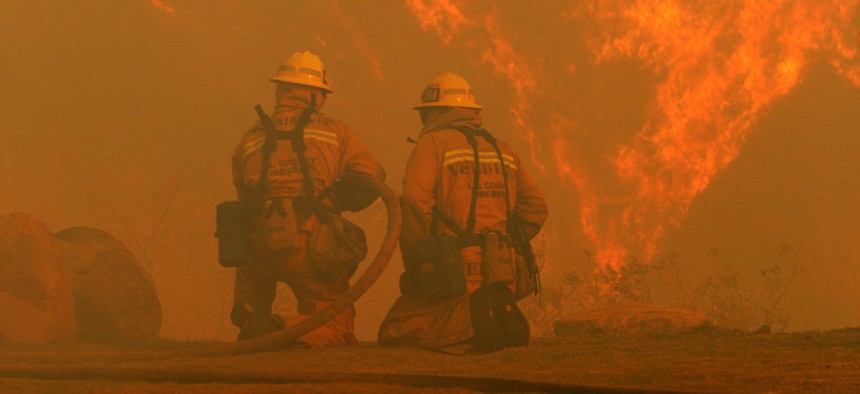As Western States Continue to Burn, Fatigued Firefighters Are a Growing Concern

Shutterstock

Connecting state and local government leaders
Some have been wearing devices to measure alertness and impairment.
It’s been a grueling summer for firefighters battling wildland blazes in western states, including the Carr Fire in Northern California, which destroyed more than 1,000 homes in and around the city of Redding and was finally brought to 100 percent containment last week. But there’s no shortage of other fires to attend to.
While the public may understand the inherent dangers that firefighters face from smoke and flames, there’s another hazard of significant concern: fatigue.
Although cardiac arrest and vehicular accidents have already been determined as leading causes of firefighter fatalities, a recent study by two researchers at the University of Idaho, Randy Brooks and Callie Collins, looks more closely at “the daily activity and body composition of firefighters,” according to the Moscow-Pullman Daily News, which reported on Saturday:
Brooks said participants were outfitted with Fatigue Science Ready Bands—wearable devices that resemble fitbits, but rather than measuring heart rate and blood pressure, it uses accelerometers to measure motion behavior. Brooks said the devices calibrate to the individual's behavior after being worn for close to a week. Once it has been calibrated, he said, the band can show researchers trends in activity and rest that each user engages in over a period of time—anywhere from minute-to-minute updates to patterns that stretch back over months.
A firefighter’s “alertness” score can be determined from the data collected by the devices. Not surprisingly, the lower the alertness score, the more researchers found that decision making was impaired. And impaired decision making while staring down a dangerous wildfire can lead to accidents, injuries and deaths.
Last week, as the remnants of the Carr Fire were being contained, the Redding Record Searchlight looked at the morale of local firefighters based at Cal Fire’s Station 58 in Redding:
Station 58 is not a home away from home. It has just been home, period, for the unit's men and women over the past 40-plus days.
One firefighter has logged more than 930 hours of overtime. [Cal Fire Capt. Dusty] Gyves didn’t sleep for 50 hours during the peak of the Carr Fire. Dillion Dow, in his sixth season with Cal Fire, hasn’t been home since he was put back on rotation in June.
And even as the last embers of the Carr Fire are extinguished, the men and women at Station 58 know their relaxation is fleeting. They’re still in the middle of California's peak fire season.
Fatigue fits into larger concerns regarding the behavioral health of firefighters across the nation, not just those who are battling wildfires. That includes an ongoing rise in firefighter suicides.
“We have people who need help. They've got injured. They're suffering from maybe addiction—alcohol, drug,” Capt. Mike Feyh of the Sacramento Fire Department told National Public Radio last month. “And we've found that if we can actually get out there, do a little bit of preventive education for our members, that we can actually maybe start to reduce the number of firefighter suicides, which has increased drastically over the last 10 to 15 years.”
Michael Grass is Executive Editor of Government Executive’s Route Fifty and is based in Seattle.

NEXT STORY: Poll Finds Support for Labor Unions Remains Up Compared to Past Years





